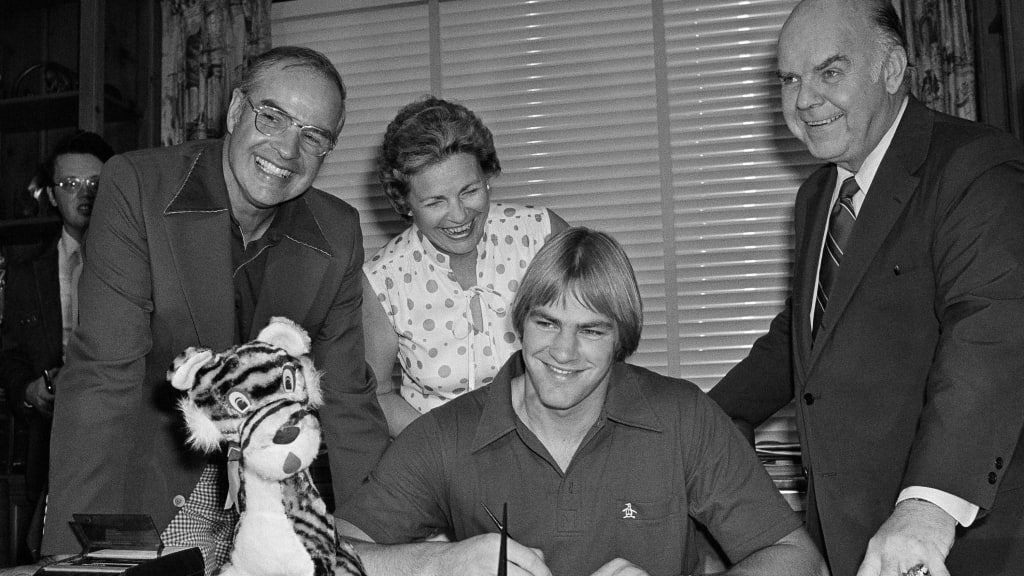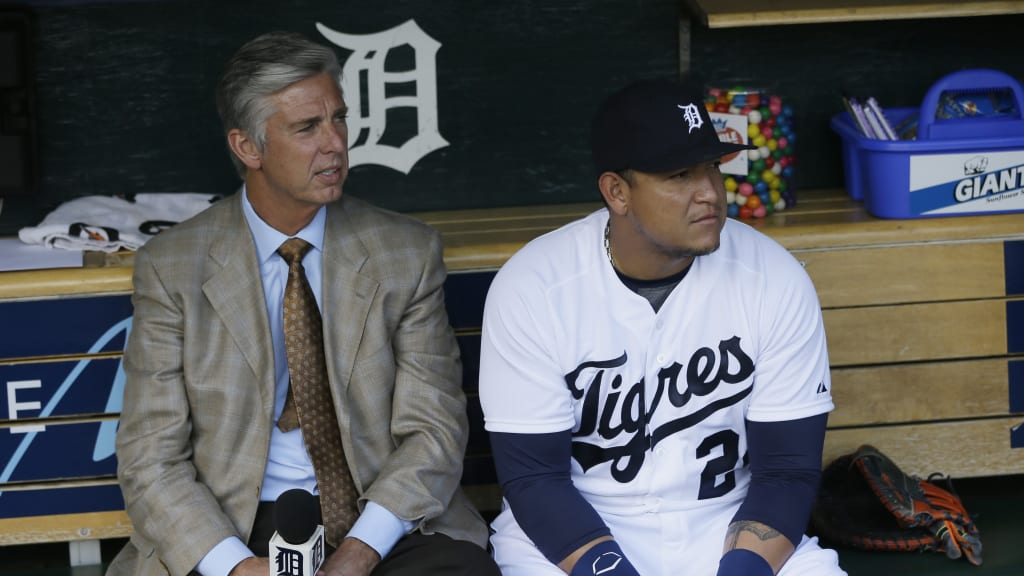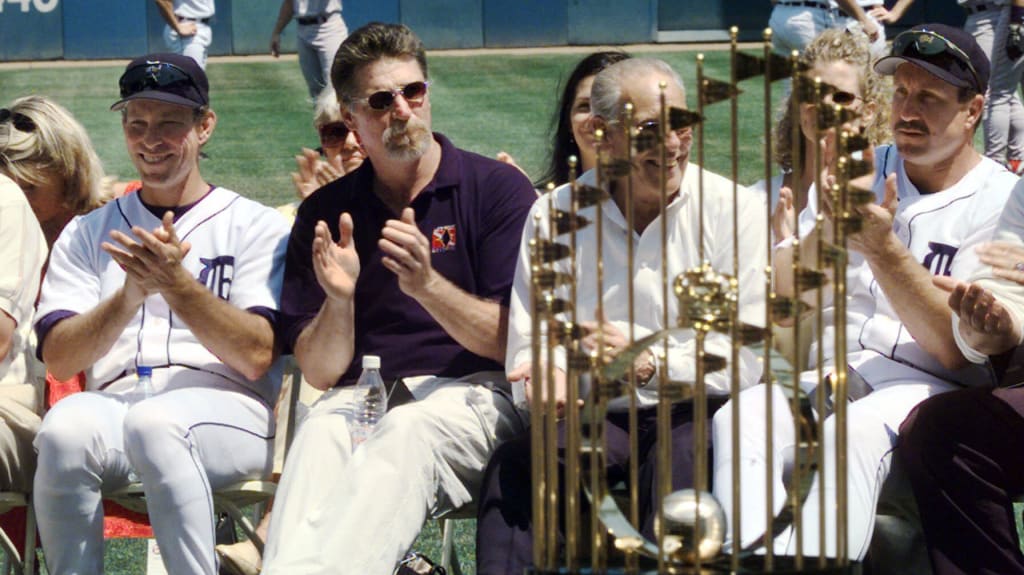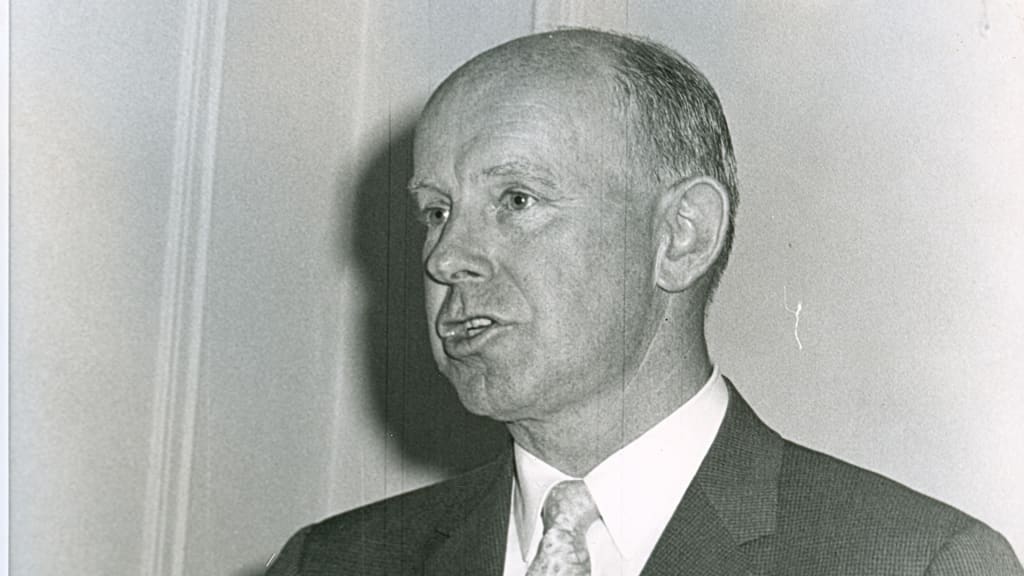
No one loves a good debate quite like baseball fans, and with that in mind, we asked each of our beat reporters to rank the top five players by position in the history of their franchise, based on their career while playing for that club. These rankings are for fun and debate purposes only. If you don’t agree with the order, participate in the Twitter poll to vote for your favorite at this position.
Here is Jason Beck’s ranking of the top general managers in Tigers history.
1. Jim Campbell, 1962-83
Key moves: Signed Denny McLain off waivers, hired Sparky Anderson, drafted Hall of Famers Alan Trammell and Jack Morris, as well as Lou Whitaker
Campbell was a baseball lifer, a former Ohio State outfielder who joined the Tigers as a Minor League business manager shortly after graduation in 1949. He spent the next 43 years rising through the organization, eventually becoming team president in '78 and moving to team chairman in the early '90s. But his 21 years as general manager defined his career, putting the pieces together for two Tigers World Series championship clubs ('68, '84). He had moved up to team president just before the '84 season, but he laid the groundwork with the core of talent.
Campbell became known as a tough negotiator and a steadfast traditionalist; the team didn’t retire a jersey number until Al Kaline was inducted into the Hall of Fame in 1980, because Ty Cobb didn’t have a number. But Campbell's ability to bring in talent was key. He acquired McLain off waivers from the White Sox in '63, enjoyed his peak seasons in '68 and ’69, then traded McLain after the '70 season for future 20-game winner Joe Coleman, All-Star shortstop Ed Brinkman and Gold Glove Award-winning third baseman Aurelio Rodriguez. Later that decade, Campbell’s scouts put together Draft classes that would form the basis of Detroit’s next champion, including Trammell, Whitaker, Morris, Lance Parrish and Dan Petry. Campbell’s move to bring in Anderson to manage at midseason in '79 provided that group its leader.

2. Dave Dombrowski, 2002-15
Key moves: Signed Ivan Rodriguez and Magglio Ordonez, traded for Miguel Cabrera, Carlos Guillen and Max Scherzer, drafted Justin Verlander
Dombrowski could crack the rankings for four franchises, if the Montreal Expos were included with the Marlins and Red Sox. The Tigers, however, marked his longest tenure, and his work rebuilding a franchise that had fallen on hard times might well be his most impressive work.
The Tigers lost 119 games under Dombrowski’s watch in 2003, but it was his work afterwards that defined his tenure with Detroit. While owner Mike Ilitch’s willingness to spend on free agents and Draft picks earned well-deserved attention, Dombrowski’s moves to acquire undervalued players proved just as vital. He pounced to acquire shortstop Guillen from Seattle after the Mariners’ attempt to trade him to Cleveland fell through. Dombrowski dealt closer Ugueth Urbina to the Phillies for second baseman Placido Polanco at midseason in '05 after Chase Utley’s arrival in Philadelphia made Polanco expendable. When Ilitch asked about Cabrera in '07, Dombrowski put together a package of prospects and outmaneuvered the Angels, who seemed on track to get him. But like Campbell, Dombrowski’s move to find a manager, coaxing Jim Leyland out of retirement after the '05 season, proved vital.
To Dombrowski, no player was off limits in a deal, but some required creativity. His least popular trade in Detroit, dealing All-Star center fielder Curtis Granderson to the Yankees, turned out to be one of his most successful, bringing in Scherzer after two seasons in Arizona and Austin Jackson on the cusp of the big leagues in a three-team trade. When many expected Dombrowski to trade for Ubaldo Jimenez in 2011, he instead dealt for a little-known Mariners starter named Doug Fister. He traded Jackson and Drew Smyly in the middle of a game in '14 in a three-team deal to get David Price at the Deadline, then traded away Price at the Deadline a year later in return for Daniel Norris and Matthew Boyd. Dombrowski traded Yoenis Céspedes shortly after that for Michael Fulmer. Not all of his trades worked out, a reminder pounded home with every Eugenio Suárez home run in Cincinnati, but Dombrowski never dealt out of fear.

3. Bill Lajoie, 1984-90
Key moves: Traded for Willie Hernandez, traded John Smoltz, signed Darrell Evans and Cecil Fielder, drafted Travis Fryman and Tony Clark
Born in nearby Wyandotte and educated at Western Michigan University, Lajoie was the scouting director under Campbell when the Tigers drafted Trammell, Whitaker, Morris, Kirk Gibson and others. After five years as assistant GM, Lajoie finally got his shot at the top job when Campbell took a step back and focused on being team president. Lajoie made an immediate impact, signing free-agent slugger Evans and making a late Spring Training trade to bring in reliever Hernandez from Philadelphia. The latter move particularly paid off handsomely in 1984.
Lajoie looked like he had swung another brilliant trade three years later to get Doyle Alexander, who went 9-0 down the stretch to help Detroit win another division title. The eventual Hall of Fame career of Smoltz, the prospect Lajoie gave up in the trade, put the deal under a vastly different historical light. Smoltz notwithstanding, Lajoie had an eye for talent and wasn’t afraid to take risks, such as signing Fielder to a two-year contract to bring him over from Japan in 1990.

Honorable mention: Rick Ferrell, 1959-62
Key moves: Traded for Rocky Colavito, Norm Cash and Larry Doby, signed Willie Horton, Bill Freehan, Mickey Stanley and Jim Northrup as amateur free agents
Ferrell was truly a baseball lifer. Originally signed by the Tigers, his 18-year career as a catcher for the Browns, Red Sox and Senators ended with him holding the American League record for games caught, later broken by Carlton Fisk. He coached with the Tigers for five years in the 1950s before going into scouting for the club. He rose quickly to scouting director before taking over as general manager in '59. He became known for trades with Cleveland GM Frank Lane in '60, swapping Steve Demeter for Cash just before the end of Spring Training, trading Harvey Kuenn for Colavito five days later, then swapping managers at midseason. The Cash trade was a gem, setting off his 15-year career in Detroit, while Demeter played just four games for the Indians.
Most important, Ferrell and his scouting team laid the groundwork for the dominant Tigers clubs of the late 1960s by signing top amateur players in Michigan before other clubs could swoop in. They signed University of Michigan catcher Freehan and Detroit high school star Horton in '61, a year after signing Stanley out of Grand Rapids, Mich., then talked Northrup out of football to sign out of tiny Alma College. Ferrell moved up to vice president after '62, then served as a consultant until '92.
